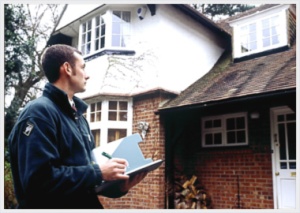What does a Surveyor look for – When surveying a House?
When surveying a house, a surveyor looks for stuffs like quality of the materials used in the construction of the building, structural damage, maintenance & workmanship quality. There are two types of surveys: Full Structural Survey for bigger or older buildings and the Homebuyer’s report for smaller, newer houses.
What Surveyors Look For Inside a House – When buying property
Here’s what Surveyors check for –
You can add this to your list of things to spot when you go for a viewing, even when it’s a discounted property:

* Cracks in walls or ceilings.
* Check internal walls for signs of damp – tell-tale signs include mould, flaky paintwork and peeling wallpaper. Another sure sign is if the wall feels damp to the touch.
* Problems with condensation – most common in kitchens and bathrooms.
* Check woodwork for holes bored by woodworm
* Beware of internal woodwork which is crumbling. This could be a sign of dry rot.
* Look in the loft/attic – check for signs of daylight showing, and whether there is adequate insulation (around 200mm).
* Check the plumbing particularly the water pressure since poor water pressure could be a sign of potential plumbing problems.
* Check for springy floors – feel free to bounce up and down.
What Surveyors Look For Outside a House – When buying property
* Check the brickwork. If the pointing is in a poor state, then damp will get in. Also check for staining in corners or below gutters.
* Check if the buying property has a damp-proof course. An older property may not have a damp-proof course – so you then need to ask the owner what measures have been taken to prevent rising damp.
* Check the roof. Ensure there are no missing tiles, and that the roof line isn’t sagging. Check the state of the guttering is not missing. With a flat roof, check for cracks or bubbles.
* Check the chimney to make sure the pointing in the brickwork is in good condition.
* Check for cracks in external walls. Large cracks may mean subsidence.
* Check if the drains are blocked or damaged.
* Check for cover-ups – such as where paint or render has been applied.
* Check for large trees near the property – roots may interfere with the foundations.
* Check doors and window frames for signs of rot.
Where Can I Find A Surveyor?
You can usually find a surveyor through recommendation from your lender, solicitor or property agents or property specialists. It’s important to use a qualified surveyor. If you can sometimes combine the mortgage with a survey, then you will have to use one from the lender’s approved panel.
However, particularly if you are buying a BMV property that’s been neglected – or one you suspect has been patched up – it’s also advisable to have an independent survey done. Even if the house seems in good condition, it could be money well spent. Either way, ensure the surveyor is a member of the Royal Institution of Chartered Surveyors (RICS), he or she will have the qualification MRICS, FRICS or TechRICS.
A property specialist buying agent like Propsavvy can insure any property you purchase has an independent survey conducted by a RICS surveyor. Usually they will cover this fee and make sure you receive the survey report direct for you to review the surveyor’s findings.

